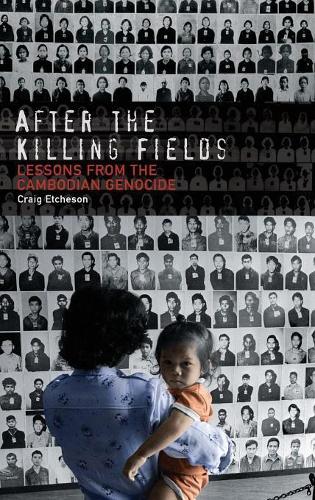
After the Killing Fields: Lessons from the Cambodian Genocide
(Hardback)
Publishing Details
After the Killing Fields: Lessons from the Cambodian Genocide
By (Author) Craig Carlyle Etcheson
Bloomsbury Publishing PLC
Praeger Publishers Inc
30th March 2005
United States
Classifications
General
Non Fiction
364.15109596
Physical Properties
Hardback
272
Description
The story of the 25-year effort to bring to justice the architects of the Cambodian genocide For 25 years, Cambodia's Khmer Rouge have avoided responsibility for their crimes against humanity. From the late 1960s to the late 1990s, the Cambodian people suffered from what the author calls a 'Thirty Years War', in which one "constant, churning presence" drove the conflict: the Khmer Rouge. New findings demonstrate that the death toll was approximately 2.2 million - about a half million higher than commonly believed. Detailing the struggle to come to terms with what happened in Cambodia, Etcheson concludes that real justice is not merely elusive, but in fact may be impossible, for crimes on the scale of genocide. This book details the work of a unique partnership, Yale University's Cambodian Genocide Program, which laid the evidentiary basis for the forthcoming Khmer Rouge tribunal and also played a key role in the international advocacy necessary for the tribunal's creation. It presents the information collected through the Mass Grave Mapping Project of the Documentation Centre of Cambodia and reveals that the pattern of killing was relatively uniform throughout the country. Despite regular denial of knowledge of the mass killing among the surviving leadership of the Khmer Rouge, Etcheson demonstrates that they were not only aware of it, but that they personally managed and directed the killing. Demonstrates that the death toll in Cambodia is significantly higher than is commonly believed Argues that upcoming trials will probably have little impact on the perpetrators Demonstrates that the surviving leadership of the Khmer Rouge was aware of, managed, and directed the killing Relevant to high-profile trials for war crimes committed in Yugoslavia and Rwanda
Reviews
More than 25 years after the fall of the Khmer Rouge regime, those responsible for genocide and human rights violations in Cambodia have yet to answer for their crimes. Why has justice for the Cambodian people been so elusive Etcheson argues that a culture of impunity persists in Cambodia, and that national reconciliation and healing will require a properly conducted war crimes tribunal, perhaps overseen by the UN. The author describes the efforts of the Documentation Center of Cambodia in amassing proof that the leaders of the Khmer Rouge ordered mass executions throughout Cambodia during the 1975-79 regime. But the abuses began earlier and continue to the present. Moreover, no one in Cambodia's political elite is completely untainted. Etcheson's historical and legal concerns are intertwined, since the evidence from documents, interviews, and eyewitness accounts, backed up by physical evidence from mass graves, is meant to combat the denial syndrome that is part of Cambodia's tragic and apparently intractable situation. These essays will appeal mainly to specialists in Cambodian political history and international politics, as well as to other readers interested in legal remedies for political violence and genocide. Summing Up: Recommended. Graduate students/faculty. * Choice *
^IAfter the Killing Fields: Lessons from the Cambodian Genocide^R is a thorough insider's description of the Documentation Center of Cambodia's valuable work. More importantly, the book probes the culture of impunity and enhances our understanding of this extraordinarily complex issue. It is a major contribution to genocide studies, as well as an eloquent tribute to the Cambodians who suffered under the Khmer Rouge. * H-Net: Humanities and Social Science Reviews Online -- H-Genocide *
[E]tcheson's great contribution is his orderly, detailed relating of DC-Cam's postwar research into the organization and location of mass murder as well as international legal efforts to bring surviving perpetrators to account. * MultiCultural Review *
After the Killing Fields is a thorough description of the step-by-step accumulation of evidence of Khmer Rouge crimes. * Times Literary Supplement *
Author Bio
CRAIG ETCHESON is a Research Associate at the Institute for Transnational Studies at the University of Southern California where he teaches research methodology and international relations theory.
